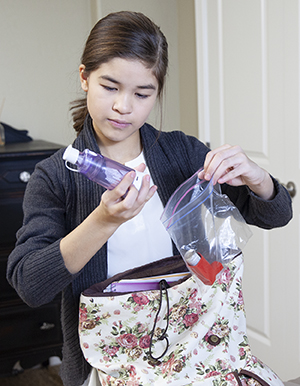Asthma is one of the main health reasons students miss school. Make sure your child has what they need for success at school. You can do this by helping them stay in good control of their asthma and learn how to use quick-relief medicine, by preparing their care team, and by working with the school for an asthma-friendly environment. It's important to tell your child’s teachers and other school staff about your child's asthma. That way, they can help your child if symptoms get worse. And they can help if your child has an asthma attack at school.
Plan a meeting
Call the school to plan a meeting with teachers and other staff. It's very helpful to have the school nurse there as well. At the meeting, talk about:
-
Asthma Action Plan. Make sure the school has a copy of your child's Asthma Action Plan. Work with your child's health care provider to make sure it's up to date.
-
Triggers that make your child's asthma worse. Common asthma triggers include dust, mold, cold air, and exercise. Discuss your child's triggers with the school staff.
-
Your child’s asthma attacks. Tell the group how your child deals with symptoms that get worse and asthma attacks when they happen.
-
Your child’s early symptoms. These might be wheezing, coughing, or sneezing. Discuss the need to stay calm and what actions may need to be taken early on.
-
What school staff should do if your child has symptoms that get worse or has an asthma attack. Give information about your child's medicines and when your child should take them. Also let them know how fast these medicines often work, and how they can help your child while waiting for the medicines to start working. Include the names of the medicines, how much your child takes, and common side effects. Make sure the staff has a copy of your child's Asthma Action Plan. Make sure the staff knows what to do if your child has severe symptoms. Or if your child doesn't get better with the first treatment.
-
Medicines. If you're leaving medicines at the school, make sure they are in a locked area that is quickly accessible when needed.
-
Important phone numbers. Tell them who they should call if your child has any problems breathing, and in which order they should try to call. Also, give backup numbers. Give them the name and phone number of your child’s health care provider.
-
Calling 911. Review when to call 911. Clarify who will be primarily responsible for responding to an asthma attack and who will be the back-up if the primary person isn't in school that day.
Know your child's rights
Many federal laws offer protection for your child if there are concerns about the way the school manages your child's asthma. These include:
-
Section 504 of the Civil Rights Act of 1973.
-
Americans with Disabilities Act (ADA).
-
Individuals with Disabilities Education Act (IDEA).
Things to remember
-
All of your child’s teachers, the school administrators, and the school nurse should know that your child has asthma.
-
Teachers and coaches don’t need to stop your child from being active or playing sports. If this happens, talk with your child's health care provider. Then talk with teachers, coaches, and the school nurse.
-
Your child should always carry a quick-relief inhaler or have ready access to their quick-relief inhaler. If your child’s school has a rule against this, talk with your child’s provider and the school. Many states now have laws that direct children with asthma to carry and use asthma inhalers with permission of both parents and providers.
To learn more
Contact the following groups to learn more about asthma:
-
Allergy & Asthma Network at www.allergyasthmanetwork.org or 800-878-4403
-
American Lung Association at www.lung.org or 800-586-4872
Featured in


